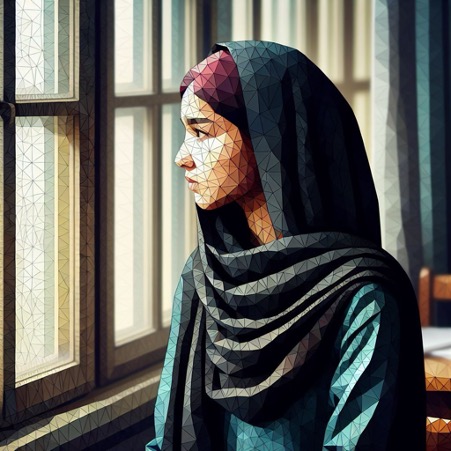Women’s History Month: Afghan Girls Struggle for Education, Part 1

To commemorate Women’s History Month, the Afghanistan Policy Lab at the Princeton School of Public and International Affairs has conducted interviews with eight courageous Afghan school-age girls in Afghansitan. These courageous individuals have been prevented from attending secondary school since the Taliban seized power in 2021. Their stories shed light on the stark reality faced by girls who once enjoyed fundamental freedoms and rights, such as the ability to attend school, participate in recreational activities, socialize with friends outside of their homes, engage in sports, and freely walk outside of their homes without a mahram (male chaperone.) Following the Taliban's takeover, unfortunately they have been deprived of those fundamental liberties. Despite the challenges, these resilient girls refuse to surrender their dreams and aspirations, and each of their stories is a testament to their resilience and courage. Online tools to resist and fight back, as one of them bravely stated: “The Taliban have a strong fear of educated women because they know if a woman gets education, she won’t raise a Talib.” Empowering Afghan women through education stands as the antidote to the Taliban's oppressive regime.
The interviews were conducted via WhatsApp messenger. To ensure the safety of the girls, pseudonyms have been used in the stories.
Salma's Story
 "I want the world to see the disparities and pains of Afghan women in the face of unimaginable hardship. I want to tell their stories.”
"I want the world to see the disparities and pains of Afghan women in the face of unimaginable hardship. I want to tell their stories.”
The Taliban’s rapid takeover of Kabul in August 2021 sent shockwaves through Salma’s world. Only in the ninth grade, she found herself in the midst of midterm exams when the news broke. To Salma, the Taliban represented absolute evil, a force that viewed women as adversaries and wielded flogging, gunfire, and explosions as their tools of control. The very thought of their rule drove Salma to think of taking her life: “I was so shaken that thoughts of suicide came into my mind,” she revealed.
The initial measures taken by the Taliban—barring girls from secondary schools and expelling women from government positions—were only the beginning of their campaign to erase women from public life. Despite these restrictions, private educational centers and universities remained open to girls for a short while. But as the Taliban tightened their grip, they systematically stripped away women's freedoms, rendering them prisoners in their own homes.
In the darkness, a beacon of hope emerged for Salma: online education. With access to high-speed internet, smartphones, and laptops, girls like Salma could defy the Taliban's efforts to keep them ignorant. Although a majority of Afghan girls were denied this opportunity, Salma was fortunate to have the unwavering support of her family and the means to access online learning resources.
Salma’s mental anguish gradually gave way as she seized every opportunity that came her way, enrolling in online English courses, participating in a book club for Afghan girls run by an American woman from a thousand miles away, and even completing a journalism program in 2023. Despite the challenges she faced, she maintained a disciplined schedule, engaging herself in a world of virtual classrooms, animations, and books. And amidst it all, she tirelessly pursued scholarships to study abroad in English-speaking countries, for the hope of breaking free from the prison that confines her now.
While Salma enjoys the support of her family, many of her peers are not as fortunate. Economic hardships and cultural norms often force girls into early marriages, robbing them of their dreams and aspirations. Salma recounts how four of her classmates, barely teenagers, have already been married off against their will. "Regrettably, very few girls receive the support of their families and have access to the internet and books. Take, for example, eight of 10 families in my neighborhood cannot afford internet costs due to poverty. Those with the means and resources to assist Afghan girls in learning and offering them words of hope are akin to rescuing them from the edge of collapse."
Salma refuses to be silenced by the darkness that surrounds her. Before the Taliban's rise to power, she dreamed of becoming a doctor. Yet, in the face of adversity, her dreams have taken on a new shape. Now, she aspires to become a journalist and tell the world to see the disparities and pains of Afghan women in the face of unimaginable hardship.
Khadija's Story
Eighteen-year-old Khadija once dreamed of attending medical school at Kabul University, but she now goes to a private midwifery institute out of necessity, just to get out of the house and feels that she has not deviated from her path yet. Khadija was in 11th grade when the Taliban seized control of the country and prevented her from attending school. During the interview, Khadija burst into tears when she explained how much she had worked hard to find her way to her favorite field. While crying, she continued: “In school, I was the first-position student from first grade all the way up to 11th. My dream was only to attend medical school at Kabul University.”
 “According to God and his messenger, seeking education is obligatory for every woman and man.”
“According to God and his messenger, seeking education is obligatory for every woman and man.”
Some private midwifery institutions remain open, allowing girls to attend while adhering to Taliban-directed hijab guidelines.
Khadija’s world is limited to her room in the house, the class at the midwifery institute, and the route between these two places. Since almost three months that the Taliban have started detaining girls from the streets, accusing them of not having the proper hijab, Khadija goes out with fears of being detained, and harmed: “When I go out, the fear of being detained and harmed by the Taliban has always been with me.”
Khadija has not seen her friends for a long time now. She sometimes talks to them through social media messenger apps. Some of her friends — as she recalls them, the luckiest ones — have left the country, and a considerable number of them have been forced into early arranged marriages: “Several of my classmates got married last year. I asked them why they had done it at a such young age. They said that without going to school what else could they do? They got married last year, and now they have kids.”
The last time Khadija participated in any recreational activities was last summer when she visited Band-e-Amir Lake in Bamiyan for three days with her family. Band-e-Amir is one of the most attractive sightseeing spots in Afghanistan, with thousands of people across the country visiting each summer.
Soon after her visit, the Taliban banned women’s entry to Band-e-Amir. The Taliban claimed that, according to Islam, women cannot be seen by men other than their family members. Now, only men will be allowed to see this beautiful lake. The year they came into power, 2021, the Taliban prohibited women and girls from accessing all recreational parks.
Khadija, who is familiar with the rules and principles of Islam regarding women, believes that the Taliban’s acts are against the teachings of Islam. According to her, the reason behind the Taliban's harsh treatment of women is that they fear educated women.
“According to God and his messenger, seeking education is obligatory for every woman and man. Taliban are afraid of educated women because they know that an educated woman will not raise Taliban. They know that an educated woman will raise educated children, not those who believe in the language of guns.”
